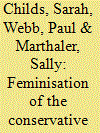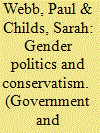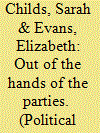|
|
|
Sort Order |
|
|
|
Items / Page
|
|
|
|
|
|
|
| Srl | Item |
| 1 |
ID:
087689


|
|
|
|
|
| Publication |
2009.
|
| Summary/Abstract |
This article makes a case for rethinking traditional approaches to the study of legislative behaviour on behalf of women by asking (1) not when women make a difference, but how the substantive representation of women occurs; and (2) not what 'women' do, but what specific actors do. The first shift aims to explore the contexts, identities and attitudes that motivate and inform substantive representation. The second seeks to move beyond a focus on female legislators to identify the 'critical actors', male and female, who may attempt to represent women as a group. In so doing, this framework calls attention to how structure and agency interact in the substantive representation of women.
|
|
|
|
|
|
|
|
|
|
|
|
|
|
|
|
| 2 |
ID:
092365


|
|
|
|
|
| Publication |
2009.
|
| Summary/Abstract |
Under David Cameron's leadership reforms have been made to the Conservative party's parliamentary selection procedures and distinct women's policy initiatives have been developed. This article, based on focus group data with party members, explores attitudes towards measures designed to recruit more women Conservative MPs. Broadly, we find that, despite widespread support for the principle of greater social diversity among PPCs, members are uncomfortable with the specific measures that have been introduced. This is largely on the grounds that anything approaching 'positive discrimination' should be eschewed in favour of the 'meritocratic' selection of candidates. Further, the members tend to resent central party 'interference' in what has traditionally been the domain of local Constituency Associations.
|
|
|
|
|
|
|
|
|
|
|
|
|
|
|
|
| 3 |
ID:
111677


|
|
|
|
|
| Publication |
2012.
|
| Summary/Abstract |
Can conservatives be feminists? This article examines the issue by exploring the case of the British Conservative Party, drawing on a new survey of party members. Under David Cameron's leadership, reforms have been made to the party's parliamentary selection procedures and distinct women's policies developed, thus addressing both the descriptive and substantive representation of women. We examine party members' attitudes towards three types of gender issue: basic orientations towards gender roles and relations; specific policy measures relevant to the substantive representation of women; and the descriptive representation of women. Detailed empirical analysis reveals that there is significant support for progressive liberal feminist positions on each of these dimensions in the party, and that sex, age and basic ideological dispositions drive such attitudes to varying degrees. Even so, support for a liberal feminist position on the descriptive representation of women - that is, the aspect of gender politics where the leadership has been most active - remains on the whole quite limited.
|
|
|
|
|
|
|
|
|
|
|
|
|
|
|
|
| 4 |
ID:
118228


|
|
|
|
|
| Publication |
2012.
|
| Summary/Abstract |
At the next general election the percentage of women elected to the smaller House of Commons risks being lower than in the current parliament, where they constitute 22 percent of all MPs. The 2008-10 Speaker's Conference identified many of the barriers faced by women and other under-represented groups and made a series of recommendations, only some of which have been introduced. The Government favours a voluntary approach to Recommendation 24, which calls for diversity data monitoring, whilst Recommendation 25 which calls for serious consideration of legislative quotas in the absence of a significant increase in the numbers of women in 2010, appears forgotten. A second Speaker's Conference should therefore be established; the issue of women's under-representation should be taken up above the party level-with legislative quotas introduced to address the system level failure of democratic representation at Westminster.
|
|
|
|
|
|
|
|
|
|
|
|
|
|
|
|
| 5 |
ID:
136158


|
|
|
|
|
| Summary/Abstract |
There has been extensive consideration of women's under-representation in the UK parliament. Here we are interested not only in the question of sex and political representation, but in parenthood too: in short, whether national politics is closed to women, and possibly men, with young children. We start with a review of the academic literature on legislative recruitment to see what it has to say about mothers—almost nothing has been written about fathers. Based on a 2013 survey of UK MPs—men and women—we then identify key features of parents' presence at Westminster. For the first time, we can be sure that mothers are in fact significantly under-represented in the House of Commons. We then consider whether arguments made to support the descriptive representation of women have purchase for mothers. Finally we consider how political institutions might be reconfigured not to be merely woman or even mother-friendly, but to be care-friendly.
|
|
|
|
|
|
|
|
|
|
|
|
|
|
|
|
|
|
|
|
|